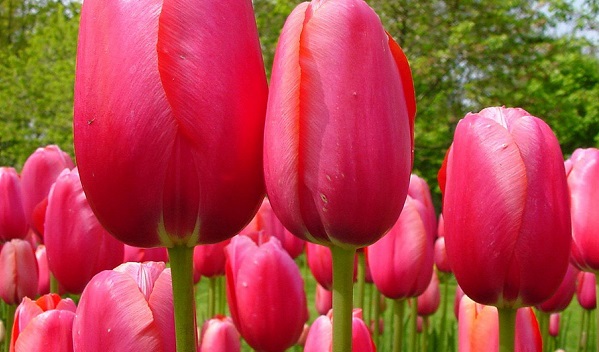Garden: Planting Bulbs for Next Spring
Cary, NC — It’s almost time to start planting spring and summer blooming bulbs. I love planting bulbs because they’re colorful, they’re fragrant and they pop-up with no work required.
Plant Bulbs in November
Here in central North Carolina, bulb planting starts in November to the beginning of December. To ensure a great display, there are just a few rules that you should follow.
The Rules
- Make sure the soil temperature is below 60 degrees.
- Buy good-quality, large bulbs, and make sure they are plump and firm – don’t worry about loose skins or small nicks, though.
- Choose a site with moist, well-drained soil or even sandy soil. Most bulbs need five to six hours of direct sun each day; previous years’ bulbs need eight or more.
- Dig each bulb hole about three times as deep as the bulb is long – five inches for small bulbs and eight inches for large bulbs.
- Plant the bulb tip side up.
- Add bulb fertilizer or bone meal to promote good root development. The bulb should not directly touch the fertilizer. Use a soil test to get the most accurate recommendation – the Ph should be in the range of 6.0 to 7.0.
- Plant in groups of 12 to 25 instead of in rows.
- Add 2-3 inches of mulch over the area to help maintain an even soil temperature.
Know that spring bulbs bloom January to May, and summer blooming bulbs bloom June to September. This will allow you to stagger your bloom cycles for the longest color displays.
Planting Tulips?
Even though tulips are one of the most popular bulbs to plant, most cultivars don’t return the following year in our state. North Carolina State University has done some studies that show most tulip cultivars are not suited for the heat here. If you want the tulips to bloom the following year you will need to make sure you follow the cultivar recommendations closely!
Resources for Bulb Planting
Mel’s Tip of the Month
The best way to tell if soil is well drained is to dig a hole one foot deep and fill it with water. If the water is gone after 8-10 hours, it is well drained.
———————————————————————————————————————————–
Melody Hughes is a North Carolina State Extension Master Gardener Volunteer and a real estate agent at Dunlap Lilley Properties, Inc. Photo by Tom Jutte.
———————————————————————————————————————————–
CaryCitizen is sponsored in-part by Garden Supply Company on Old Apex Road in Cary.



